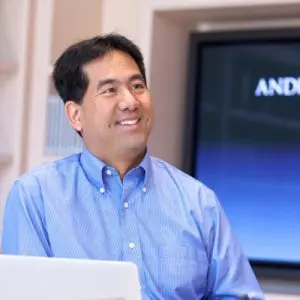I’m willing to bet you didn’t know that artificial intelligence can help sort cucumbers.
It can, and in fact it does. And while AI has gotten massive amounts of attention recently due to its role in making cars autonomous, doing facial recognition, and automatically translating languages, there’s one man in Silicon Valley who really wants everyone developing any kind of technology-based tool to know that AI has something to offer them as well.

Last year, Frank Chen, a partner at the A-list venture capital firm Andreessen Horowitz (a16z), published a primer on artificial intelligence. The 45-minute video took viewers through a history of the technology, from its “birthday” in the summer of 1956 through its years in the wilderness of technology and straight through current-day Silicon Valley, where it is dominating conversations at most of the largest tech companies there.
In fact, if the mobile cloud was computing’s previous major era, the next will be the era of AI, Jen-Hsun Huang, the CEO of Nvidia, one of the world’s largest makers of the kinds of graphics processors that power the computers behind today’s AI applications, told me last year. “It is the most important computing development in the last 20 years, and [every major technology company is] going to have to race to make sure that AI’s a core competency.”
Chen’s primer video went “unexpectedly viral,” he told Fast Company yesterday, becoming one of a16z‘s most viewed pieces of content ever. He began getting hundreds of inbound calls about AI, with everyone from policy makers to startup founders wanting him to help them understand this white-hot ecosystem. “The editor of Fashion Week called me,” Chen said, “and said, ‘Oh, will robots take all the fashion designer jobs?'”
Having been interested in AI since his days studying the technology at Stanford in the late 1980s and early 90s, Chen knew that it has now become mature enough that it’s applicable to a far wider range of people and companies than ever before. Indeed, his thinking on the matter has centered on the notion that, today, AI can help even an average product manager at Delta Airlines–the kind of role few would have imagined could benefit from artificial intelligence or machine learning–or a cucumber farmer.
That’s why Chen has now published both an AI playbook that helps just about anyone–especially non-technical audiences–understand how the technology can help them, as well as a second primer aimed at spelling out numerous ways AI has made its way into everyday life and spread well beyond the halls of the Facebooks, Microsofts, Amazons, and Googles of the world.
“AI isn’t some future thing,” Chen said, pointing to the fact that he’s seen demos of Star Trek-like language translators that you can “pop in your ear” and that should be on the market in a year or two.
In short, Chen’s explainers are offering the world his version of “Everything you wanted to know about AI, but were afraid to ask.”
CNNs And RNNs, Oh My
Many people find that trying to understand the technology underpinning AI can hurt the brain. Doing so requires digesting concepts like convolutional neural networks (CNNs), recurrent neural networks (RNNs), supervised learning, unsupervised learning, and so on. Chen is basically saying, relax, it’s okay, let’s unpack these concepts without math so that anyone can grok them.
Of course, for the more adventurous, he offers up more technical examples such as talking about what happens when you feed sentences into Baidu’s translator, or images into either Google’s or IBM Watson’s systems. He even walks people through writing a simple business card recognizer that uses an iPhone’s camera.
Yet he wants people to know that each company’s approach to AI is a bit different, with wildly different results to similar experiments. The AI wars are “the Wild West.”
Chen seems a bit amused that he’s ended up in the role of AI explainer, something he “sort of fell into it by accident.”
But having embracing that role, he’s now got an agenda: He wants people, not just hard-core technologists, to be inspired to try new things. He wants folks to see that AI has something for anyone building an application, that for everyone, there’s something AI can do to give their software a serious boost.
First, he says, it’s easier than ever to figure out how to make anyone’s software better, smarter, and more useful, and second, that it doesn’t take a PhD to understand how to incorporate AI into tools. Anyone who can figure out how to use an API can take advantage of AI, he argues.
“I want people to be excited [about AI] in the here and now,” he said. “I can’t wait for people to see what they can do once their software has superpowers.”
Yet Chen is also sensitive to how seriously confusing AI can be to some, and that many people assume the technology is “controlled by the priesthood.”
It’s not, at least not anymore, he says. And every new technology platform has felt the same way before it was democratized.
We’re just starting to get there, Chen believes, and when we do, AI will be everywhere, powering everything. And it won’t be a specialized technology anymore–once people allow themselves to really understand it and how it can work for them.
“Right now, AI’s kind of the hottest thing in Silicon Valley,” Chen said. “So every company I see represents themselves as an AI company. [In a few years] nobody will say they’re an AI company, because it’ll be assumed.”
Recognize your brand’s excellence by applying to this year’s Brands That Matter Awards before the early-rate deadline, May 3.
